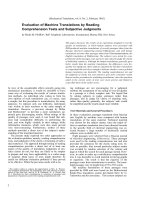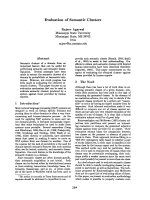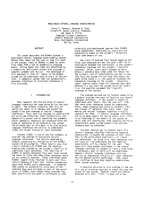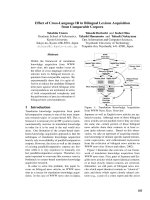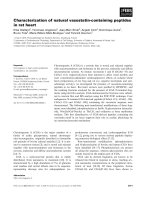Báo cáo khoa học: "EVALUATION OF NATURAL LANGUAGE INTERFACES TO DATABASE SYSTEMS: A PANEL DISCUSSION " ppt
Bạn đang xem bản rút gọn của tài liệu. Xem và tải ngay bản đầy đủ của tài liệu tại đây (67.32 KB, 2 trang )
EVALUATION OF NATURAL LANGUAGE INTERFACES TO DATABASE SYSTEMS:
A PANEL DISCUSSION
Norman K. Sondheimer, Chair
Sperry Univac
Blue Bell, PA
For a natural language access to database
system to be practical it must achieve a good
match between the capabilities of the user
and the requirements of the task. The user
brings his own natural language and his own
style of interaction to the system. The task
brings the questions that must be answered
and the database domaln+s semantics. All
natural language access systems achieve some
degree of success. But to
make
progress as a
field, we need to be able to evaluate the
degree of this success.
For too long, the best we have menaged has
been to produce a list of typical questions
or linguistic phenomena that a system
correctly processed. Missing has been a
discussion of their importance and a similar
list of unhandled phenomena. Only
occasionally were even informal evaluations
of systems conducted.
Recently, this has begun to change. In the
last several years, many of the current
generation of natural language access to
database systems have been subject to
laboratory or field testing. These include
INTELLECT, LADDER, PLANES, REL and TQA. We
have begun to discover what a user will ask a
syste m, how he reacts to its limits, and
where we need further work.
This panel brings together a good sampling of
the people involved in these tests including
Indlv iduals intimately involved with the
above systems. The position papers that
follow present ~helt unique viewpoints on the
important issues in the evaluation of natural
language access to
database
systems. These
include •
2. What has been learned about a) user
needs, b) system's capabilities and c) their
~atch with respect to tasks. Under this,
what are the most important linguistic
phenomena to allow for? What other kinds of
interactions, beside retrievals, do users
request? How good are systems at satisfying
users? How good are users at finding ways to
use systems? How satisfied are users with
systems* performance? How does these results
vary with respect to tasks?
II. What have we learned about running
evaluations? Under this, what methodologies
are capable of revealing what sorts of facts?
What are the limits of field studies versus
controlled experiments? Bow good are studies
with a simulated system,
such
as Malhotra*s
with its human intermedlary[l]? What are the
independent variables that must be allowed
for? What tools are available to determine
user
bias and experience beforehand, and user
satisfaction afterward?
IIl. On the basis of these evaluations, what
should the future look like for natural
language access to database? Under this
point, what niches look most promising for
natural language interfaces? What standards
should he set for natural language systems
performance? What kinds of evaluations
should be run in the future? How should they
be designed and how should they be judged?
In addition to the position papers that
follow, I strongly urge you to consult the
panelist
more
extensive publications.
Bibliography
[I] Malhotra, A., =Design Criterla for a
Knowledge-Based English Language System for
Management: An Experlmental Analysis", Ph.D.
Thesis, MIT, MAC TR-146, 1975.
29
